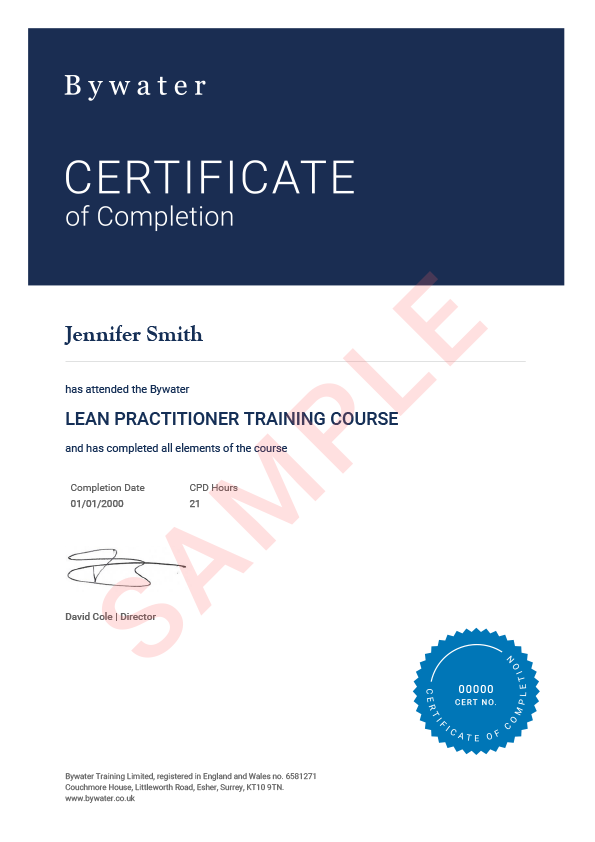Lean Practitioner Training Course
DURATION
3 daysCPD
Equivalent to 21 hoursCERTIFICATES
All delegates will receive a certificate on completion.DELIVERY OPTIONS
Learn how to apply Lean principles, tools and techniques to optimise business processes on this Lean Practitioner training course.
Upon completion of this course students will be able to confidently utilise the Lean approach to make immediate and continuous improvements in their workplace, supporting business improvement across the organisation.
All delegates will receive a certificate on completion of the course.
This Lean Practitioner training course is immediately followed in our training calendar by our Lean Leader training course, covering advanced Lean principles and tools, and resistance to change. You can claim a £195 discount when booking both together.
- why Lean?
- the 5 Lean principles
- value and the value stream
- Lean improvement projects
- Value Stream Mapping
- flowcharting and process sequence charts
- 7 + 1 wastes
- the Kanban tool for visualising process demands
- the Theory of Constraints
- Takt Time tools, for maintaining a customer-driven pace in every process
- 5S workplace organisation methodology
- Poka Yoke tools, for mistake proofing
- visual management and layout
- Force Field analysis
- managing Lean change
- application of Lean improvement
- identifying root causes
- implementing improvement and controls
- Day 1
- WELCOME AND INTRODUCTIONS
- Why Lean Management?
- Principles of Lean & Lean Implementation
- Value
- The Value Stream
- Process Flow
- Pull
- The Pursuit of Perfection
- Value Added Analysis
- The ‘PDCA Cycle’ or ‘Deming Wheel’
- Relationship to Quality Management and Six Sigma
- The International Standard for Lean & Six Sigma, ISO 18404
- Project Selection
- Sources for Project Ideas
- Project Characteristics
- Criteria for Project Ideas
- Project Charter
- Stakeholder Analysis
- Lean Project Planning & Management
- DMAIC(T) Structured Problem Solving Methodology
- CLOSE
- Day 2
- Process Management
- Value Stream Mapping
- Process Mapping
- Flowcharts
- Process Sequence Chart
- 7+ Wastes
- Waste Identification Worksheet
- Making your Layout Conducive to Process Flow
- Kanban
- Theory of Constraints
- Takt Time
- Line Balancing
- Aids to Continuous Flow
- Workplace Organisation ‘5S’
- CLOSE
- Day 3
- Poka Yoke (Mistake Proofing)
- Errors vs Defects
- Visual Management
- Why Might Process Flow Be At Risk?
- Physical Flowchart – Spaghetti Diagram
- String Diagram
- Cell Layouts
- Managing the Lean Change Program
- Performance Management
- Measurement – The Key to Continuous Improvement
- Resistance to Change
- Force Field Analysis
- Responses to Change
- CLOSE
- undertake Lean improvement tasks
- contribute to larger Lean improvement projects
- map out business processes and successfully apply Lean techniques to eliminate non-value adding tasks
- design a customer ‘pull’ system
- determine causes of efficiency problems and use Lean tools to reduce these, improving process speeds
- understand how to standardise processes across supply chains or organisations
- mistake-proof systems using Lean tools to reduce defects and errors
- make continuous incremental improvements
Delegates will also receive a Certificate of Completion, which demonstrates their commitment to professional development and their new knowledge and skills in lean business process improvement.

Upcoming course dates








A Lean practitioner reduces or eliminates non-value adding tasks in the area of the business where they work, leading to benefits such as improved cycle times, reduced defects and complaints, lower costs, and better value for the customer. They do this by utilising Lean improvement activities such as workplace layout techniques to improve process flow, understanding value streams and desired future states, and quantifying the benefits that are delivered.
Lean practitioners may also coach or train Lean improvement team members on process improvement methods and activities.
This Lean Practitioner training course is an excellent place to start if you wish to understand how Lean principles and approaches can help your organisation make improvements in customer satisfaction, efficiency and productivity. It is open to all and requires no prior knowledge of Lean.
The Lean Leader training takes delegates to the next level of learning around advanced tools and the practical application of Lean within the organisation.
We schedule the 2 courses together for the convenience of those who wish to attend both, and offer a discount if they are booked together.
Yes, you will receive a certificate after the course to confirm your attendance and confirm the new practical knowledge that you have obtained.
The 3-day course is also equivalent to 21 hours of CPD.
At Bywater we offer Lean training and Six Sigma training to help you improve business processes, efficiency and customer satisfaction. The training is a valuable mix of learning with expert tutors and opportunities to practice the skills being learned in interactive tasks.
Our Lean training describes the principles of the Lean methodology, tools that can be used, and how to address resistance to change.
Our Six Sigma training explains how you can work through the Yellow, Green, and Black Belt training programmes to build your skills in applying Six Sigma techniques and tools.
Bywater is a Royal Statistical Society (RSS) approved training provider, and a number of our leading courses are RSS certified.
Lean Six Sigma is a variation on the naming theme that combined both disciplines, and is explained in a short video on the Six Sigma training courses page.
For those who want to start learning practical Lean skills straight away, this Lean Practitioner training course is the right course for you.
If you would rather an overview of the role of Lean and how it might be applied within an organisation, you might like to look at our 1-day Lean Basics training course.
In either case, if you have a number of people who would benefit from Lean training, then we do offer dedicated training, which can be arranged just for your organisation at a time and place to suit you. Do contact us to discuss your needs.
Customer reviews
Bevan Motor Bodies|24th Mar, 2025
Sentric Safety Group|14th Feb, 2025
Pandrol Ltd|14th Feb, 2025
Glazpart Ltd|13th Feb, 2025
Element Materials Technology|6th Feb, 2025
Fountain Fresh Imports Ltd|26th Nov, 2024
Ooni Limited|19th Nov, 2024
Wanner International Ltd|12th Nov, 2024
3t Global|5th Nov, 2024
Fiander Tovell|11th Sep, 2024
Binding Solutions Ltd|10th Sep, 2024
Nanoco Technologies Ltd|21st Jun, 2024


